In celebration of International Women's Day, we shine a spotlight on Tampa Electric’s Energy Supply Technical Trainer Rita DeHart. Thanks to her courage, grit and perseverance, Rita broke barriers and defied stereotypes in 1977 as the first female co-op student at a TECO power plant. As she gears up for retirement in April, Rita’s legacy stands as an inspiring testament to resilience as a trailblazer in a traditionally male-dominated industry.
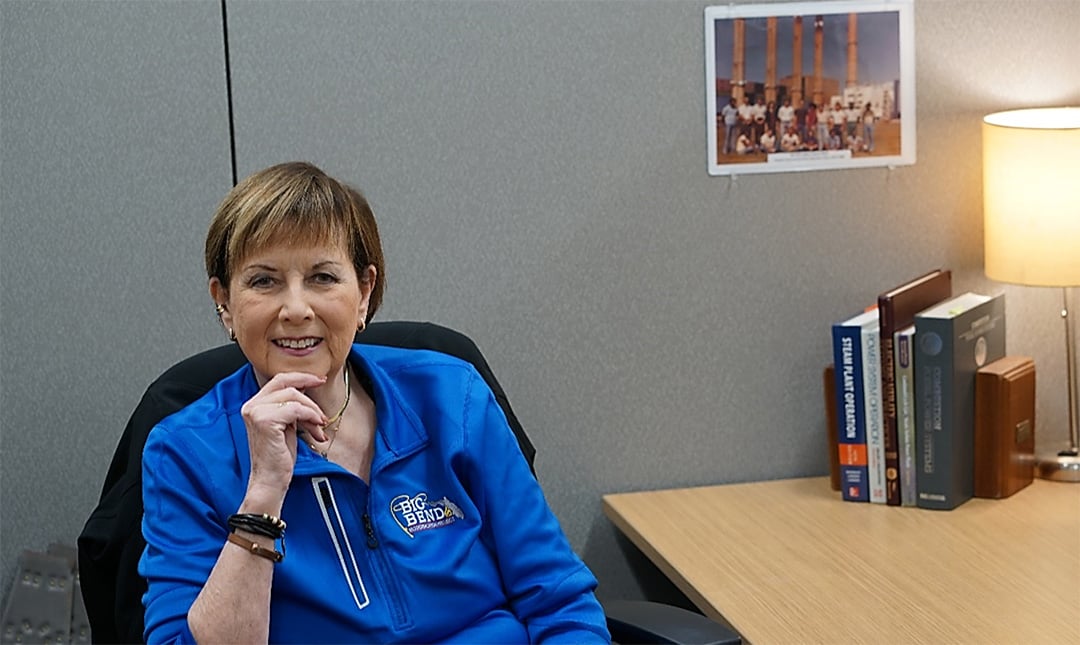
What was your initial inspiration to pursue a career in the power industry, especially considering its male-dominated nature at the time?
I have always thought machines of all types were cool, even as a small youngster. I was also fascinated by electricity from an early age.
Between the ages of 12 and 15, I noticed a large “factory-looking-thing" with multiple smokestacks that could easily be seen from the 22nd Street Causeway here in Tampa. I later found out the “factory-looking-thing” was Tampa Electric’s Gannon Station, and that it made electricity.
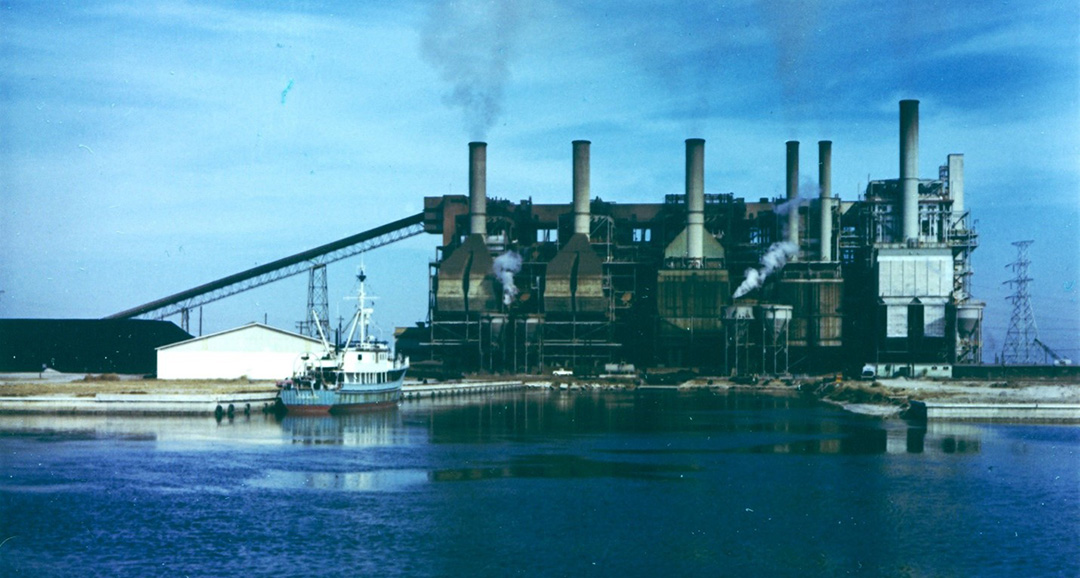 Gannon Station as it Appeared in the Early 1970s. Photo by Steve Gandy Commercial and Aerial Photography.
Gannon Station as it Appeared in the Early 1970s. Photo by Steve Gandy Commercial and Aerial Photography.
I was hooked and enrolled at the University of South Florida’s Electrical Engineering program, thinking it was the fastest route to the power plant. Although electrical engineering is a very honorable profession, it did not present the mechanical and thermal sides of the process I desired, so mechanical engineering was a closer fit.
However, I found out there was an even better way to learn the power plant to the “Nth Degree,” and that was operations. What better way to learn the details than to actually operate a power plant?
In the late-1970s, I moved out of state and was privileged to be selected for Tennessee Valley Authority’s Student Generating Plant Operator training program in 1979. It was a two-year program that taught us how a power plant works – down to the last valve. To date, that program is the best education I have received.
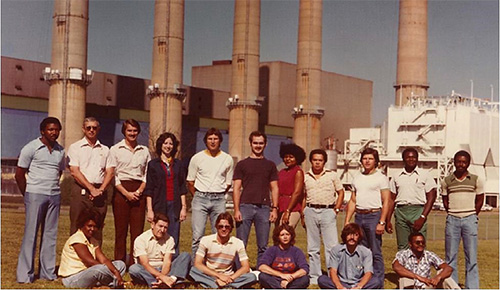 Tennessee Valley Authority Student Generating Plant Operator Class, 1979.
Tennessee Valley Authority Student Generating Plant Operator Class, 1979.
Rita is fourth from the left on the top row.
It did not concern me at the time that operations was a male-dominated field; I was focused on the power plant and how it worked.
As the first female co-op student sent to our power plant in 1977, what was the atmosphere like, and what challenges did you face?
Actually, it went quite well. The day I walked on to the plant site, there was some good-natured humor and kidding around, which was to be expected. I joined in with the humor and had a good time. If there was any sense of unwelcomeness at Hookers Point Station during that time, I did not notice it, nor did I hear anything about it.
My biggest worry was lack of physical strength that was often required in operations. My best friend during that time was the valve wrench, which enabled me to open and close valves that I could not have done by hand alone.
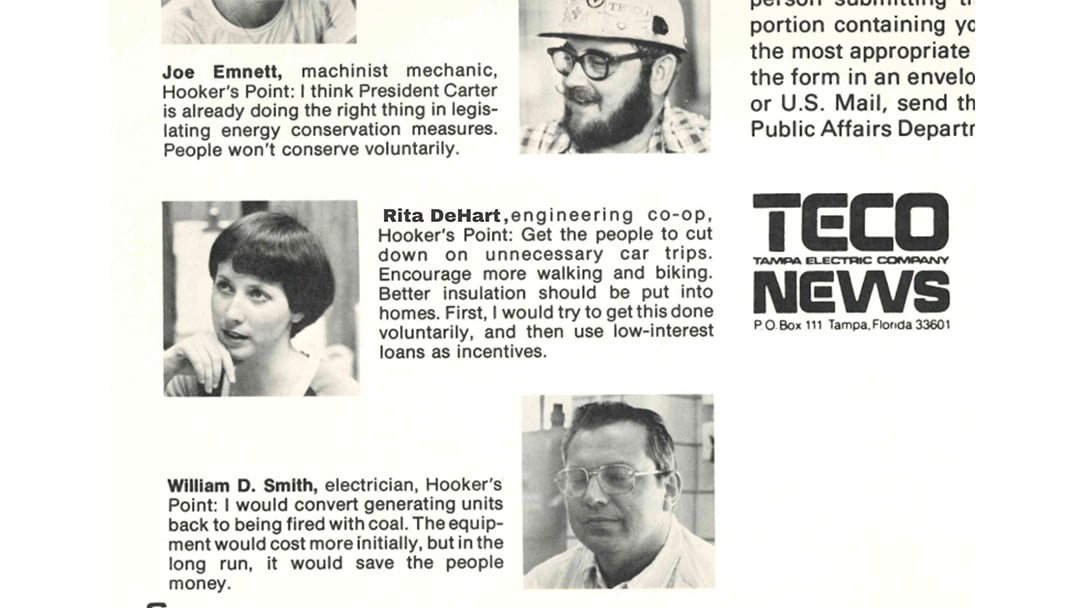
Rita appeared in TECO News as a Co-Op Student at Hookers Point Station, 1977
At what specific moment or project did the courage, grit and perseverance you've demonstrated play a crucial role in your success?
It is difficult to pin down one specific moment, but on two occasions I spoke at the National Board of Boiler and Pressure Vessel Inspectors conference (Kansas City and Colorado Springs). I was also privileged to have been published twice in their magazine, “The National Board Bulletin.”
Another interesting occurrence was speaking at a hearing before selected members of the North Carolina State Legislature regarding possible State requirements for boiler operators to hold stationary engineer licenses (which requires training and experience to prepare for the examinations).
I also served as Vice Chair of the American Society of Mechanical Engineers (ASME) Codes and Standards Committee for the Qualification of Fossil-Fuel-Fired Plant Operators (QFO) in the 1990s and early 2000s. Unfortunately, that committee has undergone the sunset process.
There were also various other speaking engagements and conference/hearing attendance.
How have you seen the industry evolve in terms of diversity and inclusion over the years?
According to the United States Census Bureau, women working in engineering occupations increased from 3 percent in 1970 to 15 percent in 2019.
According to Zippia, Inc., (a job-locating organization), the percentage of women power plant operators was 5.1 percent in 2021. Between 2010 and 2021, the lowest percentage was 3.61 percent in 2012.
Although I wish these percentages were higher, I have noticed positive changes. In 1972, the badge of being an engineering student was to carry a T-Square and a slide rule (yes, that far back). I recall getting funny looks (and a few cat calls) because I was a woman carrying those supplies. Now, it is not unusual at all to see women engineers in most organizations. This is a good thing.
What was one of the most rewarding aspects of your career?
In 1988, I developed and presented my first “Basic Power Plant” class at another organization. The visual aid was a flip chart with hand drawn images. Despite the primitive audio-visual equipment, the class was successful, and more were requested. Through the years, I have presented variations of that course at several organizations, both as an employee and an outside consultant. That class has been very popular, for which I am thankful.
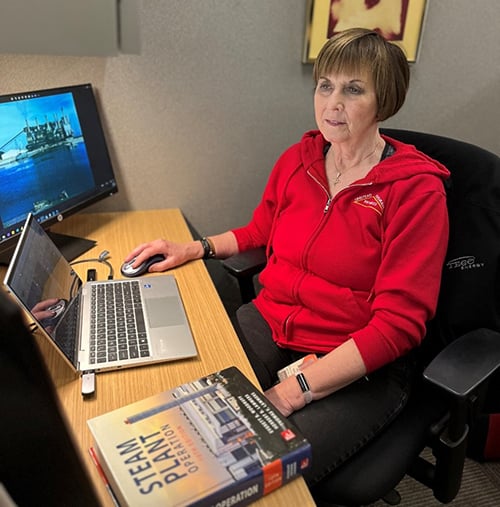 Rita preparing for “Introduction to Power Plant Systems”
Rita preparing for “Introduction to Power Plant Systems”
On a bittersweet note, the latest variation of that course is “Introduction to Power Plant Systems”, and I will be presenting my final TECO session the third week of March just prior to my retirement date.
You are retiring in April. Reflect on your career and what you hope to leave behind for future generations of women entering the power industry.
Looking back, I have been privileged to have had more than one accomplishment that I am pleased with. As an example, a recent accomplishment has been working with fellow trainers in the development and presentation of Big Bend’s new combined cycle unit training.
The only possible legacy I can think of is that women might be more comfortable discussing their technical knowledge to others because they have seen me do it. No one should ever feel apologetic for being smart.
My advice is this: focus on the pursuit of excellence. Learn and apply everything you can regarding the technical details of your field; make it a part of you. Know your stuff thoroughly.
“No one should ever feel apologetic for being smart,” -- Rita DeHart.

